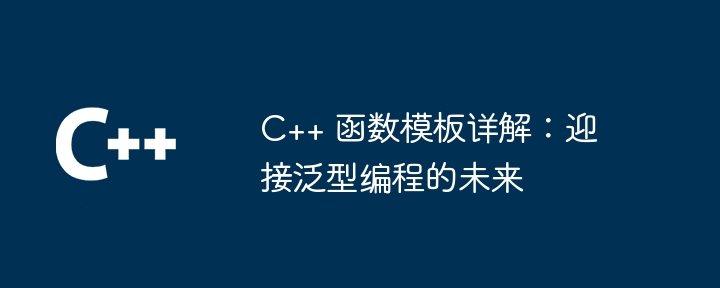Home >Backend Development >C++ >Detailed explanation of C++ function templates: welcoming the future of generic programming
Detailed explanation of C++ function templates: welcoming the future of generic programming
- 王林Original
- 2024-04-28 16:18:021132browse
Function templates in C allow the creation of generic functions for handling various data types. They define a family of functions where types are provided as arguments. Syntax: template 75a837cf562f69348eb0e119bf9e56d8returnType functionName(parameterList); instantiate by providing a specific type when used, such as exchanging two integers: int main() { int x = 5; int y = 10; swap(x, y ); }, improve code reusability and flexibility.

Detailed explanation of C function templates: welcoming the future of generic programming
Preface
Function templates are a powerful feature in C that allow you to create generic functions that work on a variety of data types. This makes it easier to write generic code that can be reused in a variety of scenarios.
What is a function template?
A function template defines a family of functions where types are provided as parameters. In other words, a function template defines a blueprint of a function, while the actual function will be generated at compile time by providing a specific type to the template.
Syntax
The syntax of the function template is as follows:
template <typename T>
returnType functionName(parameterList) {
// 函数体
}Among them, 75a837cf562f69348eb0e119bf9e56d8 is the template parameter, which Represents the type on which the function will work. returnType is the return type of the function, parameterList is the parameter list of the function.
Practical case: function to exchange two values
The following is a generic function template to exchange two values:
template <typename T>
void swap(T& a, T& b) {
T temp = a;
a = b;
b = temp;
}This function can Used to exchange values of any type, such as integers, floating point numbers, strings, etc.
How to use function template?
When using function templates, you only need to provide a specific type to instantiate it. For example, to swap two integers, you can use the following code:
int main() {
int x = 5;
int y = 10;
swap(x, y);
cout << x << " " << y << endl; // 输出:10 5
}Conclusion
Function templates are powerful tools in C that allow you to easily write generic code, thereby improving code reusability and flexibility. By understanding how function templates work and their syntax, you can take advantage of their power to write robust, general-purpose programs.
The above is the detailed content of Detailed explanation of C++ function templates: welcoming the future of generic programming. For more information, please follow other related articles on the PHP Chinese website!

